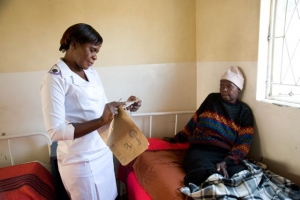
Faith based organisations like Caritas have a key role to play to end AIDS by 2030. Credit DAvid Snyder/Caritas
UNAIDS, the UN organisation coordinating the global response to HIV, is moving from a strategy of ‘zero new infections, zero AIDS-related deaths, zero discrimination’ to one where 9 out of ten people who are living with HIV know their HIV status, receive therapy and that the virus is surpressed in their bodies.
But at the opening session of the 20th International AIDS Conference in Melbourne, Australia, UNAIDS Executive Director Michel Sidibé unveiled plans for a new strategy to ‘end AIDS by 2030’.
More than half of the people living with HIV infection are not aware of their condition and have no way to access anti-retroviral treatment (ART). Many of those who know of their HIV may begin treatment but then stop taking the medicines and thus cannot benefit from their life-saving effects.
As a result, those who withdraw from or never commence treatment may continue to live with a high amount of virus in their blood and other body fluids and can infect others through sexual contact or contact with infected blood or through mother-to-child transmission.
So Mr. Sidibé said that UNAIDS was launching a more specific treatment strategy based upon the ‘Ambitious treatment targets: writing the final chapter of the AIDS epidemic’ discussion paper.
It includes these targets to be achieved by 2020.
• 90 percent of all people living with HIV will know their HIV status.
• 90 percent of all people with diagnosed HIV infection will receive sustained ART.
• 90 of all people receiving ART will have durable suppression of the amount of virus in their body.
He said that achieving these targets by 2020 will enable us to end the AIDS epidemic by 2030 but needs the strong determination of governments and civil society and local communities.
In a discussion session on this new strategy, Dr. Mark Dybul, Executive Director of the Global Fund to Fight AIDS, TB, and Malaria, said faith-based organisations have a key role in making these goals become a reality.
During his address to the Catholic Pre-Conference on HIV and AIDS on 19 July, UNAIDS Deputy Director Dr. Luiz Loures said that ending AIDS will not involve the eradication HIV but rather aims to reduce the number of new infections of HIV to a very low number. It also means maintaining those already on anti-retroviral treatment.
Caritas Internationalis Special Advisor on HIV and Health, Msgr. Robert Vitillo is a member of the UNAIDS Treatment Advisory Committee and will be engaged with scientific experts to further refine this strategy during the course of the 20th International AIDS Conference.
(With additional reporting from Elisabeth Bernasconi, Caritas Internationalis Intern in Geneva)
